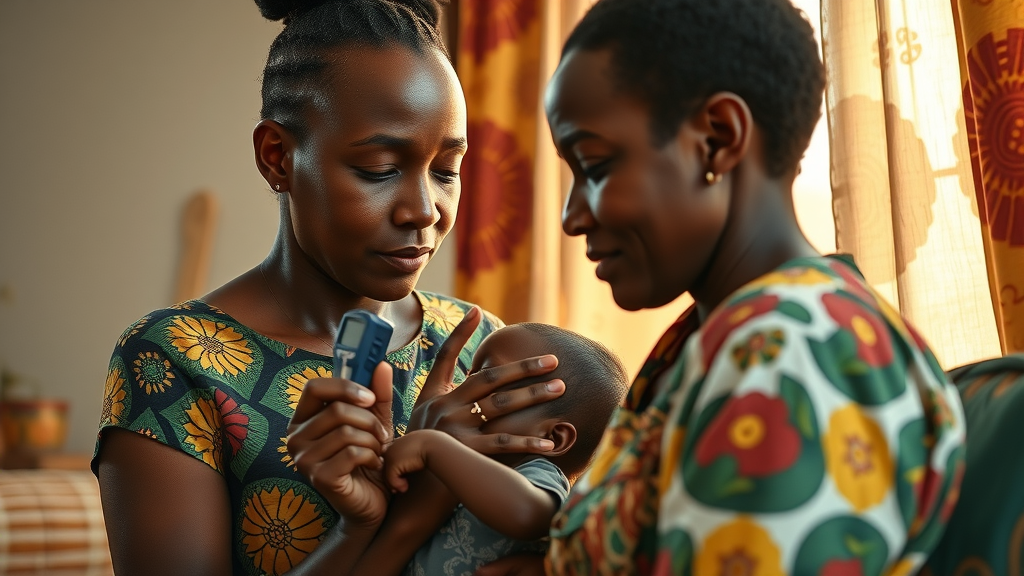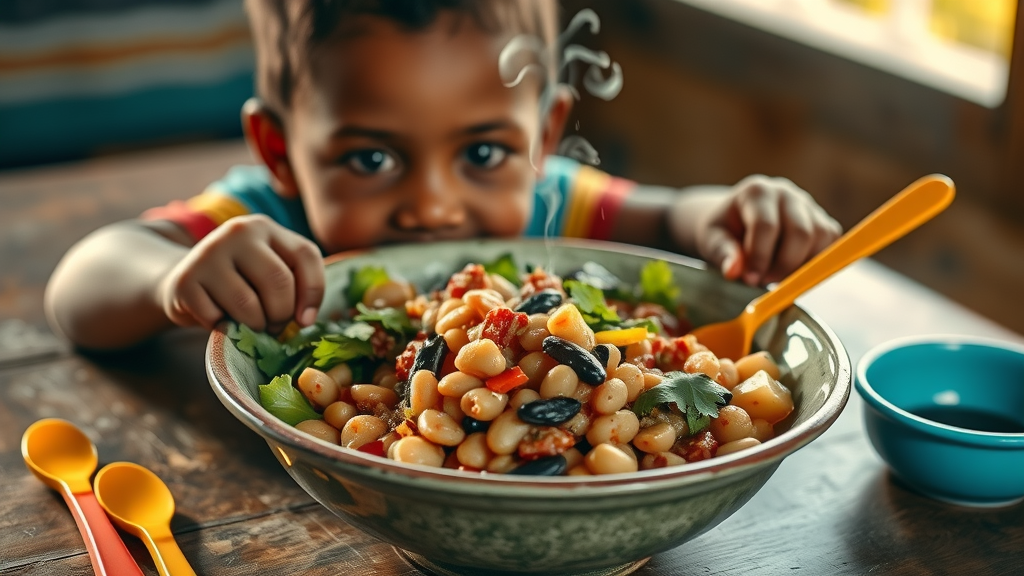“Every parent in Kampala wants the best for their child, but Uganda’s unique environment brings daily worries and urgent questions. Through community, tradition, and practical wisdom, you can foster healthy, happy children.”

It’s 2 am in a Kampala neighborhood. You wake to your child crying with a fever. You wonder: Is this a common childhood illness, or something serious like malaria? Should I use a home remedy or rush to the clinic? Every Ugandan parent wrestles with these worries, balancing tradition, expert advice, and what’s possible in the Kampala environment. This guide offers practical, evidence-based answers, with respect for Uganda’s rich culture, and real advice you can count on for child health Uganda.
What You'll Learn: An Expert-Backed Guide to Child Health in Uganda
How to manage fever and common illnesses using local remedies
Practical nutrition advice highlighting matoke, beans, and other Ugandan staples
Understanding childhood vaccination schedules and their importance
When to seek medical care and when home care is appropriate
Seasonal health issues affecting children in Kampala
Cultural child-rearing practices and modern evidence-based care
Facing Uganda's Unique Child Health Challenges
Understanding Child Health in Uganda: Pediatric Care Kampala and the Burden of Disease
Tropical diseases: malaria, typhoid, respiratory infections
Local child health statistics: prevalence of childhood illness, malnutrition rates, vaccination rates
Impact of rainy and dry seasons on health: malaria surges, dehydration risks
Role of extended family and community in child health
Uganda’s environment shapes every decision a parent must make for their child. Tropical diseases like malaria and typhoid are leading threats, and acute respiratory infections are frequent, especially during seasonal changes. According to the Uganda Ministry of Health, more than 25% of childhood deaths are linked to malaria, while pneumonia, diarrhea, and malnutrition also contribute heavily to illness in Kampala’s children. Malnutrition rates remain a concern, over 29% of Ugandan children under five are stunted due to poor diet or chronic infections.
Seasons matter, too. During the rainy months, standing water allows mosquitoes to thrive, spiking malaria cases. Conversely, dry stretches bring dehydration and diarrhea risks, especially when safe water or fresh produce is scarce. Yet, in all seasons, the extended family and community play critical roles: grandparents, neighbors, and elders pass on remedies, support with childcare, and reinforce best health practices. Modern pediatric care Kampala now works hand-in-hand with these traditions, ensuring children have both ancestral wisdom and medical science on their side.
“Parents often worry about fevers, but knowing when to seek help can save lives. Our team works every day to support families facing Kampala's unique health needs.” – Dr. Namusoke, Case Clinic Pediatrician
Seasonal Child Health Risks in Uganda |
||
Season |
Major Risks |
Prevention Tips |
|---|---|---|
Rainy |
Malaria, flu, colds |
Mosquito nets, vitamin C, dry clothing |
Dry |
Dehydration, diarrhea |
Hydration, food hygiene, ORS packets |

Feeding Your Child Well: Childhood Nutrition in Uganda Using Matoke, Beans, and Local Foods
Childhood Nutrition Matoke Beans: Essential Local Diets for Growth
Benefits of matoke (green bananas): energy, potassium
Beans and groundnuts: protein and healthy oils
Local vegetables: greens, carrots, pumpkin, avocado
Affordable meal ideas for families in Kampala
Myths and facts: traditional feeding vs. modern guidelines
What your child eats every day is the foundation for their immune system, growth, and learning. Uganda’s agricultural bounty offers powerful staples—matoke (green bananas), beans, and groundnuts. Matoke provides energy and potassium, fueling active play and supporting muscle function. Beans and groundnuts supply protein and healthy fats necessary for growing bodies, enhancing satiety and strength.
Affordable nutrition is possible even on a tight family budget. Combining matoke or maize porridge in the morning with a bean-and-vegetable dish at lunch ensures a good mix. Include leafy greens, carrots, pumpkin, and avocado, which are abundant and supply vitamins and minerals crucial for cognitive and physical growth. Unfortunately, childhood malnutrition is still prevalent: according to the 2021 UNICEF Uganda Report, 29% of children under five are stunted, mainly from low dietary diversity. Dispelling myths is essential—while traditions like giving watery porridge early may persist, modern guidelines recommend thick, nutrient-dense versions packed with local flavor.
Typical Ugandan Child Meal Plan |
||
Meal |
Foods |
Key Nutrients |
|---|---|---|
Breakfast |
Maize porridge, boiled eggs |
Energy, protein |
Lunch |
Matoke, beans, vegetables |
Carbs, protein, vitamins |
Dinner |
Rice, groundnut sauce, greens |
Iron, healthy fats |
“Local foods like matoke and beans offer powerful nutrition. Combining them gives children the strength and immunity they need.” – Nutritionist, Makerere University

Vaccination: Your Child’s Shield – Uganda’s Immunisation Guidelines and Case Clinic Support
Why Immunise? The Role of Pediatric Care Kampala in Protecting Child Health Uganda
Uganda Ministry of Health vaccination schedule: BCG, polio, DPT, measles
Latest vaccination rates and progress
How Case Clinic supports family immunisation
Cultural acceptance and common hesitations about vaccines
Vaccination is one of the surest ways to protect your child from life-threatening diseases. The Uganda Ministry of Health runs a robust immunisation program, with most children receiving BCG and polio vaccines at birth. As per the 2022 National Immunization Coverage Survey, over 90% of Ugandan children receive core infant immunisations—yet gaps remain in rural and low-income communities. Pediatric care Kampala, especially at Case Clinic, emphasizes family-friendly immunization, using community health workers to reach hesitant families, explain vaccine side effects, and address misconceptions.
The standard vaccine schedule protects against tuberculosis (BCG), polio, DPT (diphtheria, pertussis, tetanus), measles, and yellow fever, among others. Booster shots before school entry at ages four to six are critical to maintain protective immunity. Recent efforts have introduced new vaccines for hepatitis and Hib, reducing deadly childhood infections significantly. Culturally, vaccine acceptance is increasing—helped by testimonies from local leaders and visible results: the national under-five mortality rate has dropped nearly 40% in a decade, largely thanks to vaccines.
Uganda Childhood Vaccination Schedule (Age & Vaccines) |
||
Age |
Vaccination |
Importance |
|---|---|---|
Birth |
BCG, polio |
TB, polio prevention |
6,10,14 wks |
DPT, HepB, Hib, polio |
Prevent deadly diseases |
9 months |
Measles, yellow fever |
Prevent outbreaks |
“Immunisation is the strongest shield we have for our children. Parents’ commitment has changed Uganda’s childhood survival rates.” – Uganda Ministry of Health Representative

When to Worry, When to Wait: Recognising Emergency vs. Home Care for Child Health Uganda
Fever, Coughs, Diarrhoea: Knowing What’s Urgent in Pediatric Care Kampala
Warning signs: difficulty breathing, persistent vomiting, unresponsiveness, convulsions
Home care tips: using ORS, fever management, rest and nutrition
When to visit Case Clinic or a local health centre immediately
The role of traditional remedies: when they help and when to seek medical advice
Knowing when to treat your child at home and when to seek emergency medical care is as important as any medicine. Many routine fevers or mild coughs can be managed with rest, proper fluids, and local remedies. But certain symptoms, especially in Kampala’s high-risk climate, signal danger—and parents must respond quickly to protect their child’s health.
Emergency symptoms include a high fever (over 38.5°C) lasting more than three days, severe dehydration (such as sunken eyes or no tears when crying), persistent vomiting or diarrhea, difficulty breathing, and convulsions. If any one of these is present, head to Case Clinic or your local health center without delay. For common symptoms, simple home solutions do work: oral rehydration solution (ORS) for diarrhea, tepid sponging for fever, and resting in a cool, shaded area. Traditional remedies—like herbal teas or warm compresses—may provide comfort. However, always consult a health professional before mixing traditional and modern treatments.
-
Emergency Symptoms (Seek Help Immediately):
• High, prolonged fever (over 38.5°C for 3+ days)
• Severe dehydration (sunken eyes, no tears)
• Continuous vomiting or diarrhoea
• Difficulty breathing
• Convulsions
-
Safe Home Management:
• Maintain hydration with clean fluids/ORS
• Use of traditional remedies with medical consultation
• Rest and gentle foods

Building a Health Partnership: Working With Case Clinic and Your Community
Extended Family, Community, and Pediatric Care for Child Health Uganda
How to communicate with your health team
Family and community education for healthier children
Addressing economic realities: free and low-cost child health resources
Respecting local discipline, care, and parenting styles
Raising a healthy child in Kampala is not just a parent’s responsibility—it’s a village affair. Grandparents, siblings, aunties, teachers, and community elders all contribute to a child’s well-being. Keeping communication open with your pediatric team at Case Clinic means sharing symptoms, family concerns, and cultural beliefs freely. Case Clinic offers family education, support groups, and links to free vaccination drives and nutrition programs so every child, regardless of background, can access quality care.
Economic challenges are real for Ugandan families. Seek out local government or nonprofit programs that provide essential services at no or low cost—vaccines, growth monitoring, and nutritional supplements are frequently available across Kampala. Whether you follow time-honored child discipline, rely on herbal remedies, or embrace new medical advice, merging tradition and science ensures the best outcomes for every Ugandan child.
“In Uganda, raising healthy children is a collective effort. Grandparents, neighbors, and healthcare providers each play a part. Don’t hesitate to ask for support.” – Case Clinic Family Counselor
A pediatrician from Case Clinic explains the Ugandan child vaccination schedule and the impact of timely immunization.
People Also Ask: Child Health Uganda
How can you protect your child against serious diseases?
Answer: Following the recommended vaccination schedule, maintaining good hygiene, ensuring proper nutrition with local staple foods like matoke and beans, using mosquito nets, and seeking regular pediatric care in Kampala are the best ways to protect children from serious diseases in Uganda.

Why does the CDC recommend immunizations?
Answer: The CDC recommends immunizations to prevent children from contracting deadly and debilitating diseases, reduce outbreaks, and support public health. In Uganda, vaccination programs are essential for protecting child health and improving national health statistics.
Which immunization should the nurse recommend be administered between 4 and 6 years of age?
Answer: Between 4 and 6 years of age, the Ministry of Health Uganda recommends booster doses for DPT (diphtheria, pertussis, tetanus), polio, and measles vaccines. These protect against severe childhood illnesses as children enter school.
What are the factors affecting immunization?
Answer: Factors affecting immunization in Uganda include vaccine availability, parental awareness, cultural beliefs, accessibility of health centers, cost, and trust in medical providers. Outreach and education can improve coverage.
Key Takeaways: Raising Healthy Children with Confidence in Uganda
Leverage local foods for childhood nutrition: matoke, beans, fruits, vegetables
Understand and follow Uganda’s vaccination schedule
Know when symptoms require urgent medical attention
Work with extended family, community, and health professionals
Embrace both traditional and modern approaches in caring for children
Frequently Asked Questions (FAQs) About Child Health Uganda
What is the single most important thing parents can do for child health Uganda?
Ensuring children receive full immunisation, maintain good hygiene, and eat a nutritious local diet is vital for lifelong health.How can low-income families optimize nutrition using affordable local foods?
Emphasize staple foods like matoke, beans, and locally grown greens; buy in bulk at markets for cost savings; use home gardens for fresh vegetables.Is it safe to use traditional medicines alongside vaccines?
Always consult a health professional; many traditional remedies are safe, but some may interact with modern medicine. Combine with caution and expert input.Where can I find free vaccination clinics in Kampala?
Most government health centers, mobile outreach teams, and Case Clinic periodically offer free vaccination days—check local radio or clinic notices for updates.
Conclusion: Partnering for a Healthier Future
“Your journey as a Ugandan parent is unique. By combining tradition with trusted modern care, every child in Kampala can thrive.”
Call to Action: Discover Case Medcare Services Uganda
For expert pediatric care, community health programs, and family-friendly support, visit Case Medcare Services: https://casemedcareservices.org.
 Add Row
Add Row  Add
Add 


Write A Comment